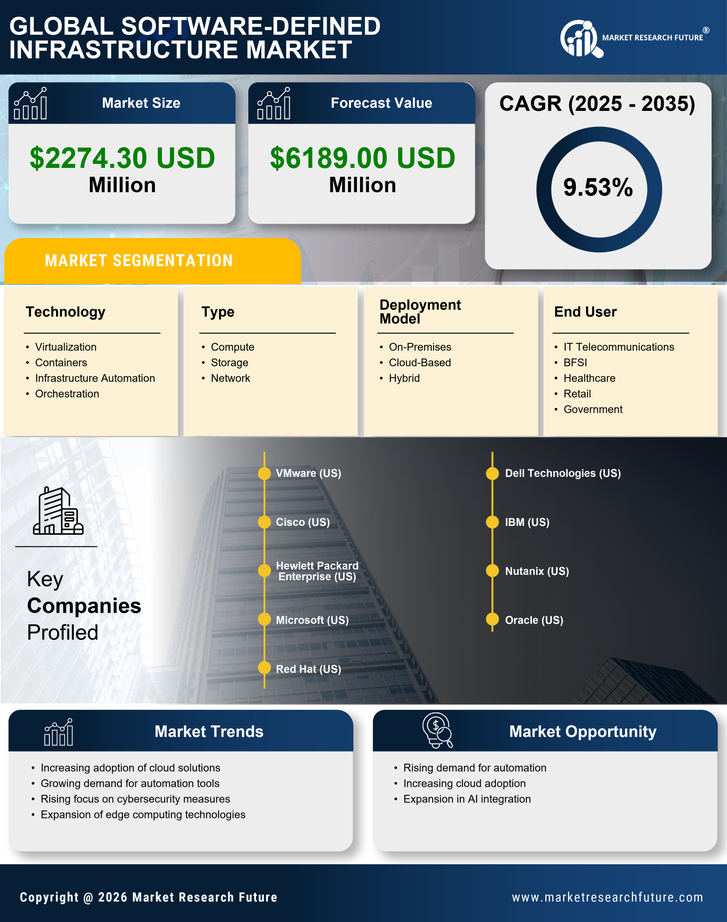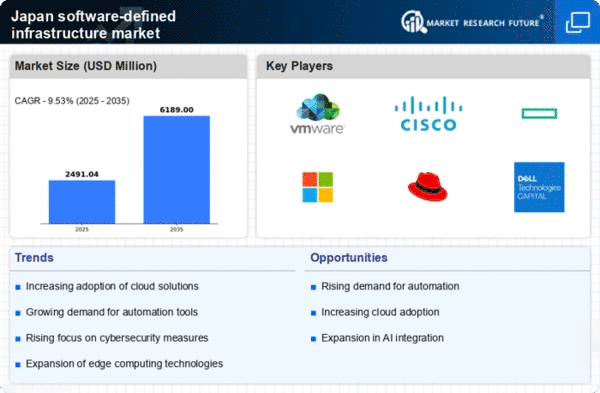Focus on Cost Efficiency
Cost efficiency remains a driving force in the software defined-infrastructure market in Japan. Organizations are increasingly seeking ways to reduce operational costs while maintaining high performance levels. The shift towards software defined infrastructure allows for more efficient resource utilization, which can lead to substantial cost savings. Data indicates that companies adopting these solutions have reported up to 30% reductions in IT operational expenses. This focus on cost efficiency is particularly relevant in industries facing tight margins, such as retail and manufacturing. As businesses continue to prioritize financial sustainability, the demand for cost-effective infrastructure solutions is expected to bolster the software defined-infrastructure market.
Rising Demand for Scalability
The software defined-infrastructure market in Japan is experiencing a notable surge in demand for scalability solutions. As organizations increasingly seek to adapt to fluctuating workloads, the ability to scale resources dynamically becomes paramount. This trend is particularly evident in sectors such as finance and telecommunications, where operational efficiency is critical. According to recent data, approximately 65% of enterprises in Japan are prioritizing scalable infrastructure to enhance their agility. This shift not only facilitates cost management but also supports the rapid deployment of applications, thereby driving growth in the software defined-infrastructure market. The emphasis on scalability is likely to continue as businesses strive to remain competitive in a fast-evolving digital landscape.
Government Initiatives and Support
Government initiatives aimed at promoting digital transformation are playing a crucial role in the software defined-infrastructure market in Japan. The Japanese government has launched various programs to encourage the adoption of advanced technologies, including software defined infrastructure. For example, initiatives that provide financial incentives for technology upgrades have led to increased investments in infrastructure modernization. Reports suggest that public sector spending on IT infrastructure is projected to rise by 20% over the next few years, further stimulating the software defined-infrastructure market. This supportive environment is likely to foster innovation and drive the adoption of cutting-edge solutions across various industries.
Growing Importance of Data Security
The growing importance of data security is a critical driver in the software defined-infrastructure market in Japan. With increasing cyber threats and data breaches, organizations are prioritizing secure infrastructure solutions to protect sensitive information. The implementation of software defined infrastructure allows for enhanced security protocols and better compliance with regulations. Recent surveys indicate that approximately 70% of Japanese enterprises consider data security a top priority in their IT strategy. This heightened focus on security is likely to drive investments in software defined infrastructure, as businesses seek to mitigate risks and ensure the integrity of their data.
Integration of AI and Machine Learning
The integration of artificial intelligence (AI) and machine learning (ML) technologies is significantly influencing the software defined-infrastructure market in Japan. Organizations are increasingly leveraging these technologies to optimize resource allocation and improve operational efficiency. For instance, AI-driven analytics can predict infrastructure needs, allowing for proactive scaling and management. Recent studies indicate that around 58% of Japanese companies are investing in AI and ML capabilities to enhance their infrastructure management. This trend not only streamlines operations but also reduces downtime, thereby enhancing service delivery. As AI and ML continue to evolve, their impact on the software defined-infrastructure market is expected to grow, potentially reshaping how businesses approach infrastructure management.

















